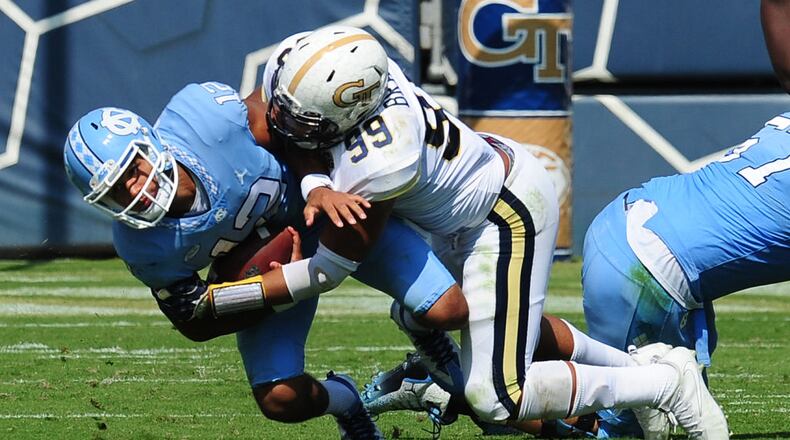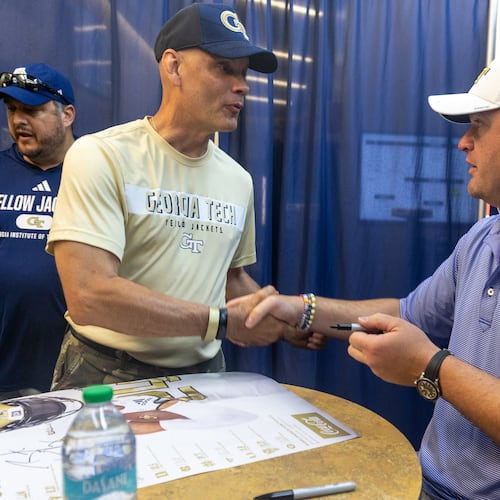The reality struck Desmond Branch in the tunnel leading to the Mercedes-Benz Stadium field on Labor Day night. Together with his teammates, the Georgia Tech defensive tackle could hear the roar of the sellout crowd. He ran out onto the field in a plume of smoke. Millions would watch him play that night on ESPN. Analyst Kirk Herbstreit would hail his play.
“While running (onto the field), I just remember thinking back, like, man, I was just a guy from New Mexico,” Branch said.
Branch called it a proud moment, one that he achieved by gambling on himself. He has followed it with many more moments this season, becoming a dependable member of the Yellow Jackets’ defense, an undersized defensive tackle who has earned the respect of his coaches with his effort and production.
“It was just like, I did it,” Branch said, recalling his emotional epiphany at Mercedes-Benz Stadium. “I had a plan and I actually fulfilled it and I’m seeing the fruition of my plan.”
Branch, whose team plays Virginia on Saturday in Charlottesville, Va., is a junior in his second season at Tech. He enrolled in January 2016 after transferring from Trinity Valley Community College in Athens, Texas. That followed one semester at New Mexico.
Before that, he was a boy from Rio Rancho, New Mexico, the youngest of four brothers (Alan, David Jr. and Brandon), all of whom played college football. His eldest brother, Alan, starred at Michigan and has since played 11 seasons in the NFL at defensive tackle. Desmond’s visits to Michigan Stadium and Ohio Stadium and time spent in front of the television watching him play on ESPN and ABC shaped his vision for what he wanted out of his own college experience.
He accepted a scholarship to New Mexico, redshirted his first season and agonized over his desire to keep pursuing that dream, one that he couldn’t realize with a team averaging under 25,000 fans and rarely experiencing the high-wattage atmosphere of power-conference life.
“When I was at New Mexico, I was really emotionally torn,” he said. “Like, do I really want to take this risk and leave a pretty good thing that most people would pray for and try to achieve my dream?”
He turned to Alan, 11 years his senior, for advice. As Desmond recalls it, Alan asked him what would make him happy, and if he thought he could play at the power-conference level. The answers were yes, and he left New Mexico for junior college.
Despite his confidence in himself, the risks were clear. Power-conference schools don’t always recruit junior colleges. He could get hurt and not be able to collect game video to send out. The recruiters might not agree with his own assessment of his ability. His own teammates at Trinity Valley, many who would have loved to get the sort of scholarship that Branch had just given up, were a reminder of the steep grade of his attempted climb.
“Junior college is definitely a lot of pressure,” he said.
Branch used that stress to his benefit. Lining up at defensive end and trying to value every game snap and practice rep, he collected 10 tackles for loss with a team-high seven sacks.
“You’ve really got to focus,” Branch said. “I would say junior college is where I really grew up, coming into who I am now and how I approach every situation.”
But he was still far from power-conference football. At one game, he said, he counted 35 fans in the stands.
Tech does not typically venture in the junior-college market. In coach Paul Johnson’s tenure, Tech had signed only one player out of junior college before Branch – defensive end Kenderius Whitehead. And the Jackets weren’t looking in this instance, either.
But defensive line coach Mike Pelton got an email touting Branch. Coaches receive a lot of emails like this, but this one was different. It was from Alan Branch. It stood out because Alan was then in his ninth NFL season. He has won two Super Bowls with the Patriots, including one over a certain team from Atlanta in February.
“Anytime a D-lineman sends me one, I check it out,” Pelton said at Tech’s 2016 signing day. “He’s a pro, so I figured he knows what he’s looking for.”
Pelton liked his game video and flew to Texas to meet with Branch, who eventually picked Tech over Mississippi State, SMU, San Diego State and others. Branch was now at a power-conference schools with football tradition. Now he just had to get on the field.
In 2016, Branch began the season at defensive end, but didn’t play much, behind Antonio Simmons, Anree Saint-Amour and Antonio Simmons. He was moved to tackle during the season, a daunting assignment for a player whose size (6-foot-3, 270 pounds) would be considered immense for just about any pursuit besides FBS defensive tackle. Branch said he was hurt by the move at first, seeing himself as an end, but put it behind him. He hadn’t risked his future football just to sulk.
“You always want to play,” he said. “It took me a couple days to get over it, but after that, I was ready to rock with it.”
Branch began to earn playing time, had a good spring practice and earned the starting job. He has started all seven games this season. He has brought his quickness to the interior, which has helped him beat blocks, and played with effort. His 10 tackles are second most behind Brentavious Glanton’s 14, and he has 2.5 tackles for loss, three pass breakups, three passes defensed and one quarterback hurry.
“He’s fought his tail off in there,” Johnson said. “He plays hard, he gives you what he’s got. He sure does.”
He has won over his teammates, as well.
“He’s quick with his hands, he can play inside or outside,” cornerback Lance Austin said. “Desmond’s a real cool guy.”
As likely is the case with most of Austin’s teammates, Branch was the first New Mexican that Austin, from Lamar County (between Atlanta and Macon), had ever met.
“He’s a guy from out West, so he’s not like me and you,” Austin said. “But he’s a cool guy.”
Branch credits Pelton, the one who brought him from junior-college obscurity to Tech, for his development.
“Coach Pelton, he understands I’m not the biggest person,” Branch said. “I’m not the biggest person in the ACC. That’s obvious. But he works with me and he works with my strengths and tries to exploit my strengths, not to cover my weaknesses, but expose my strengths as much as possible to put me in a good situation.”
A good situation indeed.
“It’s a really good feeling,” Branch said. “It’s just kind of rewarding, so I’ve got to get out there every time.”
About the Author
Keep Reading
The Latest
Featured



